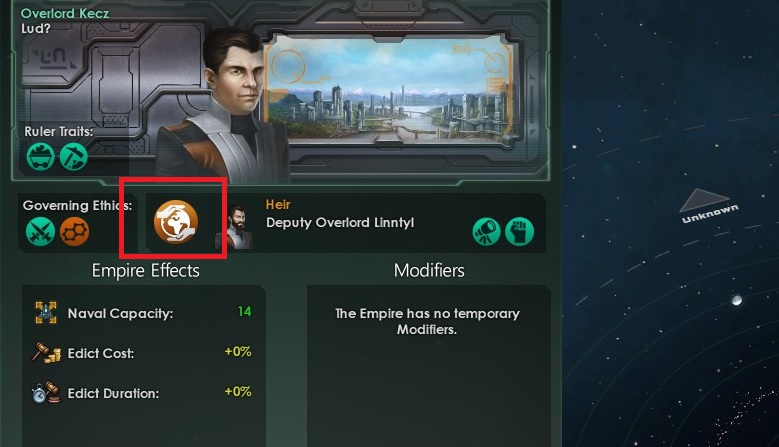Government modifiers in Stellaris Stellaris guide, tips
Last update: 14 March 2019
This chapter of the guide will tell you more about political modifiers of the chosen faction.
The system is defined by the ethics of the given government. Depending on the chosen political system, you can access different modifiers. You can change the political system only if the chosen ethics allow such a move. There are 15 variants available. Changing the system costs 250 influence points and changes the value of the modifiers directly after completing the reform of the government.

Changing the system is useful if the research you've completed provides you with similar bonuses as your political system, and you'd like to achieve different bonuses. If your influence income is good, you can change system often, so it fits your current objectives.
- Buildings cost
- Slave's production efficiency
- Food production (slaves)
- Energy credits
- Minerals
- Commander capabilities
- Commander recruitment cost
- Happiness
- Size of the pool of leaders
- Empire leaders limit
- Edicts cost
- Edicts standing time
- Main sector planets
- Research pace
- Research alternatives
- Resettlement cost
- Navy limit
- Ship maintenance
- Ship cost
- Ship upgrades cost
- Army maintenance
- War-time happiness
Buildings cost
This modifier gives you a per cent discount for constructing specific buildings. It regards both buildings on your homeworld, as well as other planets.
Notes: Useful throughout the whole game. Decreasing the cost of construction compensates the costs of the continuous modernization of the buildings allowed by the development of technology.
Slave's production efficiency
This modifier concerns the populations that you have enslaved. Individual population slots on a planet will provide a greater per cent income, depending on the resources that you gather there.
Notes: Useful only for aggressive players. If you control many planets, of which populations you've managed to enslave, you should change your system to one that provides bonuses that are useful for a dominant nation.
Food production (slaves)
You can limit the number of slots on enslaved planets. Provides a per cent bonus for food produced by slaves, which makes their population develop quicker.
Notes: Especially useful after enslaving a population decimated with war. If capturing the planet severely decreased the numbers of the population in the sectors you can use this modification to stimulate the regeneration.
Energy credits
Guarantees bigger monthly income. Per cent bonus determined by the base monthly income in energy credits.
Notes: Useful for maintaining surplus army and in case of increased mining output. This modifier works well if combined with modifiers of buildings and technologies. Every building, ship and station require energy, and the storing capacity of the energy is very limited.
Minerals
Guarantees bigger monthly income. Per cent bonus determined by the base monthly income in minerals.
Notes: This bonus proves useful in most circumstances. The greatest need for supplies is caused by war. A big fleet requires a lot of minerals, which will hamper the economy. You will need a lot of resources to build new ships, which can prove impossible sometimes, if your monthly income is to low.
Commander capabilities
Commanders are recruited on level 2.
Notes: Commander's level is especially useful for science institutions. Many special missions require a scientist on a given level, in order to be able to finish the research. Similarly, when examining the anomalies, the more experienced the scientist, the better the chance of finishing the research.
Commander recruitment cost
Recruiting every commander will an amount of per cent cheaper. It's counted from the required amount of influence points.
Notes: Useful throughout the whole game, though the most useful at the beginning, when you have to save as much points as you can, and chose between expanding the borders and recruiting and the scientists. Influence points allow many interesting actions, so lowering the cost will seriously expand your options.
Happiness
Population happiness bonus concern every planet of your empire. The population happiness will be increased per cent in every slot on a planet.
Notes: The population's happiness is important in two instances. When your actions are not in line with the ethics, and when planets are short on food. Increased level of happiness will help to quell rebellions and social divergence in your leading population.
Size of the pool of leaders
The pool of leaders is the number of people from among whom you can chose during the recruitment. Every leader exerts different attributes, and a bigger choice gives you more chances to get bonuses that match your policy.
Notes: Always useful. A bigger choice means more control of the bonuses that you get when you designate a leader for a given unit.
Empire leaders limit
The pool of imperial leaders is the amount of people, from whom you can chose during elections. Every leader exerts different attributes, and a bigger choice gives you more chances to get bonuses that match your policy.
Notes: In order to use those bonuses, you have to support a candidate during the elections. The candidates are most of the times recruited from among units' leaders. Useful for democratic and oligarchic societies.
Edicts cost
You guessed it. Edicts are cheaper in influence points.
Notes: Useful for every political system, especially at the beginning and in case of edicts that stand for unlimited time - you'll have to pay for them each month. Thanks to reduced costs you can introduce more edicts or save points for other things.
Edicts standing time
For edicts that affect populations of a given planet. The basic time of edict standing time is 10 years. Depending on the achieved bonus an edict can be prolonged, making its bonuses last longer.
Notes: Always useful if you want to issue edicts for longer at the same cost.
Main sector planets
Increases the number of planets which can be directly managed by the player, instead of being included in one of the automatic sectors.
Notes: This bonus is useful since having direct influence on the micro-management of the planets allows you to make sure the planets fit the needs of your civilization. The changes that you introduce on the planets of the main sector are unrestricted by the premises of your policy or the uniform sector strategy.
Research pace
Per cent increase of the speed of research in each of the three branches of science.
Notes: Important in all modes. Research influences each and every aspect of the empire, from infrastructure to military. The right pace of research can make the game, and gathering resources, a lot easier. Scientific development will be particularly important if none of the sectors surrounding your empire is neutral - in such case, you'll have to achieve scientific superiority over your neighbors in order to assume control over further reaches of space.
Research alternatives
Base amount of alternative research for each branch is 3. This modifier defines the additional number of research for each branch of science.
Notes: Everyone likes to have a choice - the bigger the better. Having more alternatives in research will help you to develop your empire according to your current needs and strategy. Having bigger choice improves the relation between game time and number of research done, which in turn allows you to reach crucial technologies faster than other empires.
Resettlement cost
Reduces the base cost of interplanetary resettlement.
Notes: Resettlement provides better influence over the development of individual populations on planets of your empire.
Navy limit
Bigger limit means more ships, without the penalty of additional maintenance cost.
Notes: Especially useful during war. Bigger limit makes sure your economy doesn't crumble under increasing military potential - you maintain resource surplus and are able to quickly replenish your ranks, in case of big losses.
Ship maintenance
Per cent decrease of the maintenance cost of your ships, counted in energy credits and minerals.
Notes: Much like the last one, this is particularly useful during war. Allows more financial flexibility - you don't have to keep your whole fleet in a spaceport, waiting for a chance to strike.
Ship cost
Per cent decrease of the cost of constructing ships.
Notes: Useful throughout the whole game. Lowers the production cost of both military and civilian ships, which allows you to have more units and realize scientific and construction objectives faster. Very useful at the beginning, and virtually compulsory during war.
Ship upgrades cost
Per cent decrease of the cost of modifying a basic design of a ship.
Notes: Along with the development of the technology, you will have at your disposal a wider range of equipment that allows modification of basic unit blueprints. It helps to save some money on ship modification, so that you're able to get more mods faster.
Army maintenance
Lowers the maintenance cost of ground troops, and planetary garrisons.
Notes: Reduced maintenance costs allows you to keep a superior planetary landing force, which will have no troubles conquering a hostile planet. Useful at every stage of the game - you always need a defensive force on your planets, as well as shock troops that can assault alien worlds.
War-time happiness
Directly influences the population's happiness during war.
Notes: Increased happiness will allow you to wage war without being afraid of social divergence. Especially useful during long and exhausting wars. Unified society makes sure you have control over your population.
